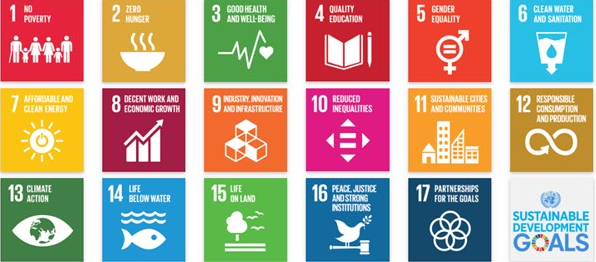OVERVIEW OF THE SDG PROGRAMME
The Sustainable Development Goals (SDGs), otherwise known as the Global Goals, are a universal call to action to end poverty, protect the planet and ensure that all people enjoy peace and prosperity.
| The SDGs are spearheaded by the United Nations through a deliberative process involving its 193 Member States. The SDGs are a set of 17 "Global Goals" with 169 targets between them, covering a broad range of sustainable development issues. These include ending poverty and hunger, improving health and education, making cities more sustainable, combating climate change, and protecting oceans and forests. |
The SDGs were endorsed by all Heads of State, including South Africa, who authorized it “without any reservations”, on 25 September 2015. This commitment was reconfirmed by the President during the World Water Week (March 2017) which took place in South Africa, and he also called for urgent action.
These 17 Goals build on the successes of the Millennium Development Goals, while including new areas such as climate change, economic inequality, innovation, sustainable consumption, peace and justice, among other priorities. The goals are interconnected – often the key to success on one will involve tackling issues more commonly associated with another.
|
 |
The SDGs work in the spirit of partnership and pragmatism to make the right choices now to improve life, in a sustainable way, for future generations. They provide clear guidelines and targets for all countries to adopt in accordance with their own priorities and the environmental challenges of the world at large. The SDGs are an inclusive agenda. They tackle the root causes of poverty and unite us together to make a positive change for both people and planet. “Supporting the 2030 Agenda is a top priority for UNDP,” said UNDP Administrator Helen Clark. “The SDGs provide us with a common plan and agenda to tackle some of the pressing challenges facing our world such as poverty, climate change and conflict. UNDP has the experience and expertise to drive progress and help support countries on the path to sustainable development.” (United Nations http://www.za.undp.org)
The 17 sustainable development goals (SDGs) to transform our world include:
'

|
Stats SA is responsible for coordinating
the national ‘SDGs effort’ for all 17
goals led by different departments.
|
These SDG goal leaders are required to interact with one another, since there is inevitable overlap within their mandates. The Department of Water and Sanitation is ahead of the curve compared to others and is using DWS’s structures and processes to help other departments climb on board. Those involved with the SDG 6 programme at DWS recognise that achieving the SDG goals is a team effort and each department must learn from the other and support individual initiatives to overcome challenges and successfully bring about the justification of the SDG programme existence.
The SDG 6 goal focuses on clean water and sanitation, and it is driven through eight targets and eleven indicators that will be used to propel different components and monitor progress. Achieving SDG 6 is not only essential for the water and sanitation sector, but it also has a major impact on all other 16 SDG goals led by others – from improving the health of our people; to curtailing hunger; improving the education of our children; maximising gender equality; and the inclusion of all, including vulnerable groups. All of the above has to be taken into account while ensuring environmental protection; minimising the impacts of climate change; and ensuring sustainable growth for our country. Water and sanitation is central to development and has a major role to play in all SDG activities.
Currently DWS is coordinating efforts internally to maintain a perfect platform for engagement with the sector, strategising our approach and creating achievable and sustainable plans that will close the gaps that currently exist. Planning is key, execution is essential and the involvement of all within the sector is critical if we are to achieve the SDG requirements culminating in sustainability by and beyond 2030.The sequencing and timing of measures including institutional reforms are pertinent, so we have to cooperate and make it cost effective by minimising trade-offs and maximising impact.
| GOAL 1: No Poverty |
GOAL 10: Reduced Inequality |
| GOAL 2: Zero Hunger |
GOAL 11: Sustainable Cities and Communities |
| GOAL 3: Good Health and Well-being |
GOAL 12: Responsible Consumption and Production |
| GOAL 4: Quality Education |
GOAL 13: Climate Action |
| GOAL 5: Gender Equality |
GOAL 14: Life Below Water |
| GOAL 6: Clean Water and Sanitation |
GOAL 15: Life on Land |
| GOAL 7: Affordable and Clean Energy |
GOAL 16: Peace and Justice Strong Institutions |
| GOAL 8: Decent Work and Economic Growth |
GOAL 17: Partnerships to achieve the Goal |
| GOAL 9: Industry, Innovation and Infrastructure |
|
|
|